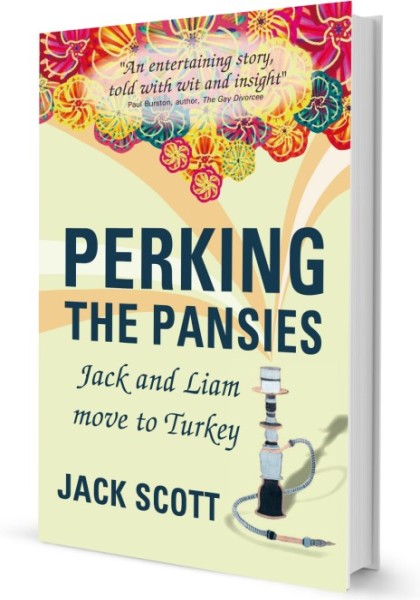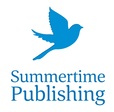JP: Tell me about your book. What is it about? Can you describe it in just a few sentences?
JS: Perking the Pansies, the book covers the first year of my life with Liam in Turkey: a culture-curious gay couple from London on a bumpy rite of passage in a Muslim country. I describe the oddballs, VOMITs, vetpats, emigreys, semigreys, debauched waiters and middle England miseries we encountered, the fun we had along the way and our subsequent move to the heart of liberal Bodrum, a place we fell in love with. It’s an irreverent look at expat life in Turkey with a right royal dose of misery and joy, bigotry and enlightenment, betrayal and loyalty, friendship, love, earthquakes, birth, adoption and a senseless murder. JP: Why did you write it? JS: From the moment we stepped ashore, we encountered so many extraordinary people and situations that I just had to start writing about them. You could say that the book wrote itself. More importantly, I felt I had something fresh to say about expat living, about Turkey and about living as a gay man in a Muslim country. The book is not about being gay as such; it’s about two people, in love, living in Turkey as expats – who happen to be gay. I thought our story was worth sharing. JP: What qualifies you to write this book? JS: Well, the book is based on a series of astonishing events that we actually encountered, so I guess that immediately qualifies me to write about them! I have travelled around Turkey since my mid-thirties and have a good understanding of the country’s history and what makes it the place it is today. Finally, as an out gay man (I dropped out of the womb waving my jazz hands and screaming I am what I am) I know a thing or two about being on the outside looking in: I feel I’m in a good position to comment on life as one half of a same-sex couple living in a Muslim country. JP: Why do you think your book needed to be written? What will it do for other people? How will it help? Did you have any competition? JS: I wrote the book for many reasons, not least because Liam and I are rare creatures in this part of the world. Gay culture is largely invisible and underground in Turkey and I hope our story may, in some small way, raise the profile of gay men and women here. It also demonstrates that it is perfectly possible to live happily within a different culture – by respecting that culture but still standing by the principles that make you who you are. Finally, it felt important to prick the pomposity and bigotry of some of our fellow expats – as well as celebrate the wonderful friendships we’ve formed here. As far as I’m aware, there is no other book of its kind on the market. JP: Who do you think will read your book? What made you think that there was a market for it? If your book has been out for a while, what proof do you have that you were right? JS: Many expat books about Turkey (and elsewhere) are about building the dream in a foreign field set against a magnificent backdrop of history, culture and landscape. I wanted to write something completely different, so I hope the book stands out from the crowd. Perking the Pansies also provides an alternative expat perspective of a British gay couple in a Muslim land. It’s not been done before and I hope people will find that interesting. Our story rattles along at quite a pace so I hope it will appeal to anyone who simply likes a good rollicking read. Initial sales seem to indicate that the book has broad appeal. Fingers crossed. JP: It does not matter how good a book is, or how good your writing is if no one knows about it. What steps have you taken or do you plan to take to promote your book? Are you a speaker or trainer? Do you have a blog? A website? A newsletter? Do you use Facebook, Twitter or other social media tools? What about press releases and sending out review copies and free articles? Have you had any other ideas? Which methods do you think work best and can you give me any examples? JS: I am a qualified trainer and a former business manager and these skills seem to have equipped me to plan and think strategically. This particular roller coaster ride began with the blog and I grew the readership by engaging with social media. The book came later. At the beginning I was a complete novice and fumbled around trying different ways to get the message out. I quickly learned that Facebook and Twitter were the big hitters for increasing an audience and for raising a blog’s SEO (search engine optimization). SEO is important because if your website doesn’t appear on the first few pages of a search result (and by this I mean Google as it’s the only one that matters) then it’s hardly worth being on the internet at all. The key to a successful blog is good, fresh content (another SEO trick), a strong appealing theme and active engagement with your audience and network. This takes hard graft. I put the hours in and it worked for me. When the book was published I already had the infrastructure to help launch it. The trick now is to break out of the blogosphere and appeal to a wider audience. This is where a strong partnership with my publisher comes in. Oh yes, that’ll be you, Jo! JP: How did you publish your book? Did you find an agent, a publisher or did you publish it yourself? Please describe your process and tell us how you found the experience. Is there anything you would definitely do again or never do again? JS: Several readers said that they thought there was a book buried among the blog posts. Eventually, I did too, and set about trying to write one and finding an agent or a publisher. You may recall that I found you on Twitter purely by chance. This is another example of the power of social networking. I emailed you. You responded almost immediately. I sent you some material, you critiqued it. I sent you more. You critiqued it again. I sent you five chapters. You said, “Let’s go for it.” That’s more or less how it happened. You took a chance and I’m rather grateful that you did. JP: What was your biggest challenge regarding the writing of your book? How have you overcome that? JS: I’d say the biggest challenge was ensuring the book had a plot that readers would find convincing and engaging enough to make them turn the page. I wanted a book with pace and very little ‘fat.’ One of the first things you taught me was to dump storylines and characters that weren’t key to the plot or didn’t add interesting flavour. I tackled this by creating a story board, much like constructing a film, and quickly found parts of the draft plot that were either superfluous or in the wrong place. JP: Now you have written this book, what has writing it done for you, your family, your self-esteem or your business? JS: It’s early days but I do feel a huge sense of achievement. It’s virtually impossible to work legitimately in Turkey as an expat; writing the book has kept my ageing brain active and prevented me from propping up the local bars (well, most of the time). Liam has supported me through the whole, painful process. He’s my whip-cracking taskmaster, poring over every word and pontificating over every sentence. There was a creative tension in the air and the occasional brouhaha over lunch. It’s genuinely been a labour of love for both of us. Becoming a published author has opened up a new (and scary) world for me. The possibilities are endless. JP: If you were to give advice to someone else who is thinking about writing a book, what would be your number one tip? JS: That’s easy. Get honest feedback about your idea and your initial drafts, especially from people who don’t know you; don’t work in a vacuum, don’t ask your friends or loved ones. They will lie (though, Liam was brutally honest). The book: jackscott.info The blog: perkingthepansies.com Facebook Fan Page: facebook.com/perking the pansies, the book Twitter: @jackscottauthor |
�
All the latest news from the team at Summertime Publishing
As an Amazon Associate, we may earn a commission from qualifying purchases. This does not affect the price you pay or your consumer rights.
Archives
June 2024
|


